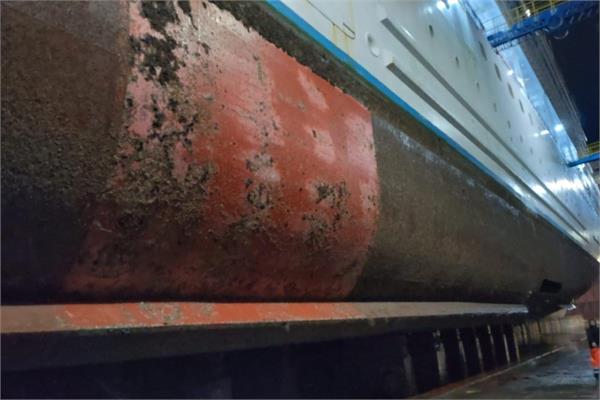
Nippon Paint Marine’s AQUATERRAS® protected cruise ship hulls from biofouling despite an enforced 18-months anchorage.
Nippon Paint Marine has announced that it has carried out a monitoring test on two cruise ships that had been coated with the biocide-free antifouling paint AQUATERRAS® in early 2019 and 2020. Despite an enforced 18-months anchorage due to COVID-19 pandemic and travel restrictions, the inspection confirmed that the hulls were in excellent antifouling conditions.
“One major cruise line performed stringent test programmes for over four years before fully applying the coating on its first ship’s hull. In-service performance monitoring gave then the operator enough confidence to apply AQUATERRAS on a second ship just before the pandemic hit. It kept the hulls clean even during the biofouling challenges of the pandemic,” has explained Niko Yamanoue, the general manager of Nippon Paint Maine Europe.
Common protective coatings usually rely on ship movements to kick-start their fouling control mechanisms. Unfortunately, during the global COVID-19 outbreak, many cruise ships set to sea without being able to provide enough operational activity to activate the process. This has led to the formation of biofouling under the hull, especially in warmer waters.
“Some cruise ships had so much fouling when they started operating again that they suffered vibration as well as significant drag and excess fuel-consumption. However, despite extensive idling and static operation in warm and temperate waters, our coating kept the hulls of the two ships extremely clean,” has stated John Drew, the director of Nippon Paint Marine Europe. “Prior to the Covid-19 outbreak, we had just two full hull AQUATERRAS applications on cruise ships. Now, demand is growing and we have had to increase production to meet that demand.”
The marine industry is increasingly focusing on sustainable processes and technologies, so paints and coatings manufacturers are required to provide high-performance solutions that will allow ship owners to protect their assets as well as reduce fuel consumption and carbon emissions at the same time. Not containing active biocides, AQUATERRAS has been specifically developed to provide all these characteristics.
“It has an extremely smooth and glossy finish. It’s much easier to apply than a silicone but its smoothness, self-polishing and resistance to fouling combine to lower hull friction. The COVID pandemic has proven the coating’s performance even in static conditions. The product goes beyond compliance but also its performance goes beyond our expectations,” has added Johan Wilckens, the managing director of Nippon Paint Marine Europe. “We anticipate it will become the benchmark eco-friendly antifouling, allowing ship-owners to reduce underwater cleaning, save fuel, lower carbon emissions and mitigate the ecological damage from biofouling and species migration. The technology in this coating is way ahead of its time. AQUATERRAS gives us a ten-year head start on the competition.”
The self-polishing coating created by Nippon Paint Marine is being considered with interest also by several largest container lines and navies, which are currently carrying out static and dynamic tests.
“Just like commercial vessels, naval vessels need to keep their hulls are clean. Otherwise, they could be prevented from entering territorial waters, ports and harbours for environmental reasons. Other ship types, such as containerships, will follow. It can give those early adopters the edge in a hugely competitive sector. It does not only strengthen their green credentials but illuminates the way forward for operators of other vessels across all maritime sectors,” has concluded Wilckens.